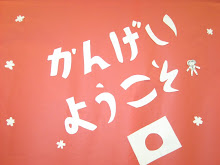キメル先生の日本語の授業
二年生: 1st semester review
VERBS:
verb conjugation groups 1, 2, and 3--characteristics of each group
copula=です, で は ありません, でした, で は ありませんでした
making the te form from the masu form: te-form song
uses of te form: polite commands, continuative tenses, “and” with verbs
tenses: non-past (habitual present and future), simple past, volitional
continuative (present and past)
ます, ません, ましょう
ました, ませんでした
て います て いません
て いました て いませんでした
kinds of verbs: traveling verbs, active verbs, existence verbs
list: eat, drink, swim, do (surfing, introduction, self-introduction, walking, swimming, horse-riding, sports, study, shopping) go, come, exists (animals & ppl.), buy, own (pets), reside, open, close, see/watch, show, sit, meet, wash, say, stand, wait, write, listen, play (stringed instruments), catch-cold, play (not sports or instruments), lend, to be late, return-home, speak (languages), enter/come-up, swim
KATAKANA
”foreign” words
foods, countries, people’s names, sports, etc.
FORMAL EXPRESSIONS:
greetings for times of day
eating
visiting (including visits to the sick)
SENTENCE STRUCTURE:
1. A=B A wa B desu.
2. wa/ga pattern sentences
はなこ さん は せ が たかい です.
けんくん は すきやき が すき です.
3. T T P O V for sentences with active verbs
time, topic/subject, place, object, verb
4. T T D V for sentences with traveling verbs
time, topic/subject, destination, verb
5. polite commands: …te kudasai
6. sentences with existence verbs and nouns of position
Place no position-noun ni person/animal ga imasu
RELATIONAL PARTICLES:
は, か, の, も, が, を , に, で, よ, ね, と, や
TIME EXPRESSIONS:
hours of day, times of day (morning, night, etc.)
days of week, months of year, seasons
next week, last week, now, today, yesterday, tomorrow
”free time”
ADJECTIVES: conjugation
two types, い (”true” adjectives) な (adjectival nouns)
COUNTERS:
ばん さい がつ じ
ようび ねんせい animals people
FAMILY MEMBERS/KINSHIP TERMS:
speaking of one’s own family (humbly)
speaking of other people’s families (honorifically)
NOUN CATEGORIES:
school subjects and classroom objects
vehicles of transportation
leisure activities, sports, hobbies, specialties
foods
places--library, schoolyard, airport, town, mountains, park, etc.
people--friend, teacher, man, woman, pharmacist kusuri-ya-san, etc.
weather
parts of body
sickness
types of schools
KANJI:
numbers 1-999
days of week
Japan, Japanese language, Japanese person
months of year
sun/day, moon/month, fire, water, tree, money/gold/metal, earth/dirt
source, book
mountain, river, woods, forest
hand, mouth, eye, ear, foot/leg
Extra kanji for kanji fans (see Sensei for explanations)
男 女 人 文楽 引き出し 車 明けまして お兄さん 門 食べます 行きます
上 した 前 後ろ 隣 側 右 左 月食 日食 見ます 聞きます お天気 雨 雪
犬 日本人 火山
SONGS AND DANCES
1. 「 Dango-san Kyoudai」
2. O-shougatsu Song
3. Te-form Song
4. Zou-san
5. Big snow song
HOLIDAYS
O-shougatsu
Seijin no Hi
Girls Day
Shichi-go-san
About Me

- O.Kimeru
- M.A. 1992 from U. of Chicago; Japan Foundation Fellow in 1987-88; research fellow Yokohama City University; Japanese language teacher since 1991; also taught French (member American Association of Teachers of French), English as a Second Language (to students), methodology of teaching ESL (to Japanese high school teachers), English, Japanese history/culture, drama; in 2002 and 2004, listed in Who's Who Among America's Teachers; member of Chicago Sister Cities Osaka Committee, and chair of its Education Sub-Committee; vice-president Illinois Association of Teachers of Japanese; Payton H.S. World Language Department Chair from 2003-2007, under founding principal Mrs. Gail Ward; taught Japanese and coordinated Japan Exchange at Payton from 2003 to 2010; Japanese teacher at Burr Public School beginning August, 2010
Followers
Blog Archive
-
▼
2010
(88)
-
▼
January
(17)
- January 28, 2010 An Eight Period Day
- January 27, 2010 A Block Two Day
- January 26, 2010 Tuesday A Block One Day
- January 20, 22, and 25, 2010
- January 19, 2010 An Eight Period Day
- January 15, 2010 An Eight Period Day
- January 13, 2010 A Block Two Day
- January 12, 2010 A Block One Day
- January 11, 2010 An Eight Period Day
- January 8, 2010 An Eight Period Day
- Japanese 4/AP first semester review summary
- Japanese 3 first semester review summary
- January 6, 2010 A Block Two Day
- Japanese 2 first semester review summary
- Japanese 1 first semester review summary
- January 5, 2009 A Block One day
- January 4, 2010 An Eight Period Day
-
▼
January
(17)